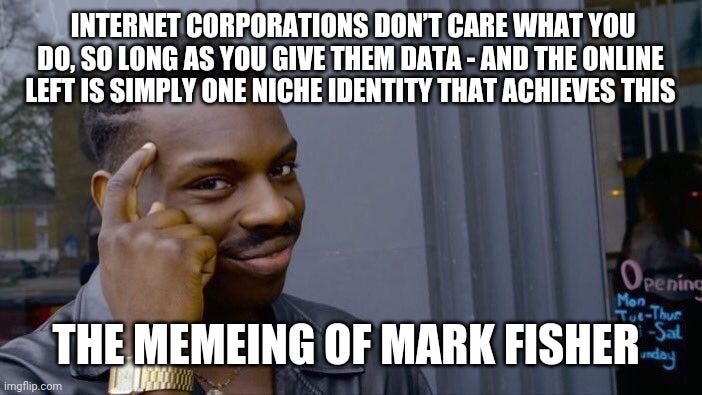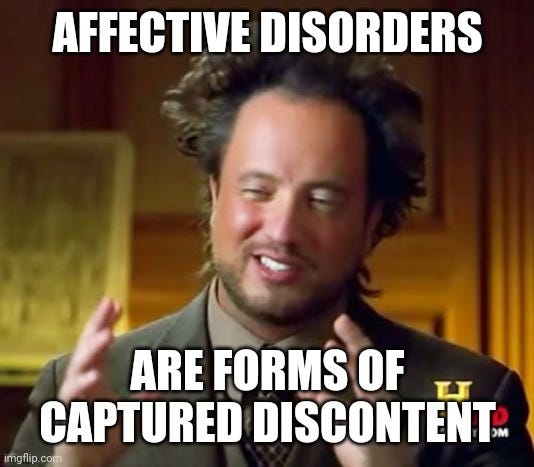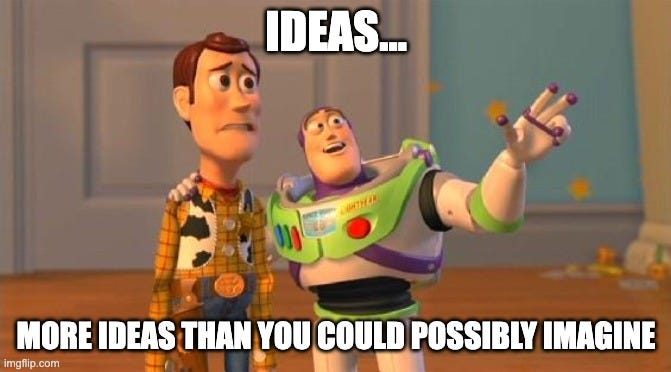Episode 11: Mike Watson - Beyond Capitalist Realism
The author of 'The Memeing of Mark Fisher' talks memes, mental health, and new currents in left-wing publishing.
It’s been over a month since we spoke to Mike Watson, the cultural critic and left-wing thinker behind the now widely-discussed book The Memeing of Mark Fisher. If you haven’t had a chance for a listen yet, the episode attempted to map the territory beyond Capitalist Realism, as Mike shared his thoughts on Keir Starmer, Acid Communism, memes and mental health.
In the weeks following the book’s publication and the airing of Episode 11, it’s fair to say a lot has happened. Mike’s left his publisher, Zer0 Books, following a change of leadership at the imprint which caused some waves in left literary circles, and exposed some fault lines which had been present for some time. Repeater Books’ Tariq Goddard made a statement about the changes at Zer0 which led to some disagreement and fallout, with other Zer0 authors and some readers also expressing frustration and disappointment.
Before we dive into the recommendations from Episode 11, let’s catch up with Mike and find out what’s been going on. As he tells us, both Repeater and Zer0 are bound up with the legacy of Mark Fisher, and the authors who continue to engage with his work.
Beyond Zero: Follow-up interview with Mike Watson
I understand the rights to your book have changed hands, and a new edition is in the works - what happened?
Basically Watkins Media, who own Repeater books bought John Hunt Publishing, who own Zero Books. This was in essence the takeover of one publishing venture dedicated primarily to mind, body and spirit books by another publishing venture dedicated primarily to mind, body and spirit books - but they both own minor politics and culture imprints, meaning Zero and Repeater are now under one roof. This is significant, as Repeater was formed by people who had originally formed Zero under John Hunt, then left and formed Repeater.
In addition to this, the new team at Zero (run by Emma Goddard, the wife of Tariq, who runs Repeater) began to criticise the entire back catalogue published by Zero under Doug Lain's tenure, saying it was populist and right wing, despite this largely not being true. For a number of reasons, I asked for the rights to my book back. I now have those rights and am considering publishing a new edition late this year or early next year.
Does the change of team at Zero make things better or worse for writers in left academic and critical circles?
The initial handling of the takeover was negative. Repeater Books put out lots of messaging to the effect that they had taken over Zero, and that they were going to improve things. It amounted to mud-slinging around Zero's previous incarnation being “the wrong kind of leftists.” I think it has damaged the publishing left. It has put writers from different imprints against one another, and split a portion of the theoretical left needlessly.
That said, there will likely be multiple publishing ventures that emerge from the fallout caused by the handling of the takeover. Doug Lain will be making an imprint linked to his new media company, Diet Soap. Alfie Bown (previously a reader with Zero) already had a new imprint called 1968 Press which has given help to Zero authors affected by the takeover, and Terry Tapp of Zero has an imprint in the works. The YouTuber Theorypleeb has also started an imprint called New Symbolization Publishing.
On top of these, one can imagine new subscription writing services and print on demand presses taking off. The recent shake up of left publishing took place at the same time as a shakeup of publishing in general, which looks to do to publishing what Pirate Bay then YouTube and Spotify did to music. In the case of text-based publishing, this has been a long time coming, especially given the fact that the internet started off being primarily text-based. Anyhow, I think positive things will emerge.
Has this changed any of your plans for future writing or projects?
Not really. Aside from probably republishing The Memeing of Mark Fisher with a new intro, I have pretty much finished a picaresque theory novel about the art world (having worked as a critic and curator for years) and am also working on a book of fragments (small theoretical texts) for now called Digital Moralia (after Adorno's Minima Moralia). I'll be looking for publishers for them soon and then working on my densest theoretical text yet, which will be about Adorno and the new digital art economy.
Tell us about your new Patreon and show - what topics will you be exploring?
The Theory in Practice is a new podcast and Patreon hosted that I'll be hosting from next month. As well as a regular podcast that aims to identify and convey the theory in political and artistic practice as well as the practice inherent to theory, there will be a regular video where I close read a relevant text. First up will be Adorno's Aesthetic Theory, which may span most of this year!
My promise with this platform is that it won't be 'fun' or 'cool'. That's not to say there won't be occasional hilarity, but I am not focusing on entertainment. This will be as serious and diligent as it needs to be to make theory useful for leftist political practice. This format, which I’ll be calling a ‘notcast’ fits within a wider push I wish to make towards a ‘slow internet’ (what I call ‘slow memes’ in The Memeing of Mark Fisher).
Left Aesthetics: Reading recommendations from Mike Watson
Let’s dive into some of the ideas and texts we discussed in Episode 11. In our conversation and in his book, Mike explored the legacy of The Institute for Social Research (better known as the The Frankfurt School). The Institute was the setting where Max Horkheimer, Theodor Adorno and others produced some of their most enduring ideas.
The ideas of the Frankfurt School underpin a lot of modern critical theory, and have gained popularity amongst critics and academics in the past few years. I’m starting to explore their work through two texts, David Held’s Introduction to Critical Theory: Horkheimer to Habermas, and a more recent book, The Left Hemisphere by Razmig Keucheyan.
Mike discussed the Frankfurt School in relation to Walter Benjamin’s Arcade Project, the inspiration for his own thoughts on the possibilities contained within the role of the ‘digital flaneur’. This 2021 online publication Memenesia, co-edited by Mike, contains an essay with his thoughts on what it might mean to be a free-roaming, culture-consuming flaneur of the modern meme-scape.
We spent some time discussing Q-Anon - for me, the best documentary on the topic was Q: Into the Storm, which ties the meta-conspiracy into the chan-boards and meme-spawning pits where it partly originated.
Staying online, I highly recommend a piece I mentioned in Episode 11, with Byung-Chul Han in the Morning Express describing the mobile phone as a modern rosary. This image has stuck with me, as many of his images do. The author of The Burnout Society is also the subject of our Episode 8, on the topic of mental health and capitalist realism. The linked newsletter also has some resources for anyone struggling with their own symptoms, conditions or recovery.
Speaking of capitalist realism, we explored a few of Mark Fisher’s key works in this episode, not limited to the seminal Capitalist Realism, and the retrospective k-punk collection from Repeater (much of which you can still browse on the original site). His Acid Communism introduction can be read online, as can his oft-quoted polemic against identity politics, Exiting the Vampire’s Castle.
We also mentioned Ireland’s #RingYerGranny campaign as an example of a positive, effective ‘slow meme’, and touched on definitions of Lacan’s notion of ‘the other’, and Hegel’s ‘Beautiful soul’.
I also brought up Guy Debord’s Society of the Spectacle, and Jean Baudrillard’s Simulacra and Simulation, both of which I think are key texts for understanding the nature of our Extremely Online reality and virtualised ‘Discourse’.
Mike also recommends The Acid Left podcast, hosted by Adam Ray Adkins, of which he was formerly the co-host. Mike’s new podcast, The Theory in Practice, is set up over on Patreon for anyone who wants to join him on his journey.
For more of Mike Watson’s writing, read his first book on memes and leftist politics, Can The Left Learn to Meme? Go follow him on Twitter and Instagram for news about his new projects. Check out his website too.
Here are a few of his recent talks, appearances and videos:
‘Art Production as Acid Communist Strategy’ - Talk for The New Centre for Research & Practice
And finally, back in January I joined an episode of You Call That Radio to discuss the history of memes, and Boris Johnson’s ongoing ‘Partygate’ scandal. I mentioned some of Mike’s ideas, and explored the connections and parallels between propaganda, memes, clickbait, and sigil magic in a follow-up essay for the YCTR blog, appropriately titled (with apologies to Mike!!) THE MEMEING OF JORIS BOHNSON. Go have a read!
Coming up: Season 2 of Strange Exiles
We’ll be back in March with a brand new season. Look out for some more bonus content, and some announcements before then. Thanks for sticking with us!
Subscribe at sptfy.com/strangeexiles
Follow @strangeexiles for updates
All subscribe links and episodes at anchor.fm/strangeexiles
Take care of each other.
- Bram E Gieben, Glasgow, February 2022









